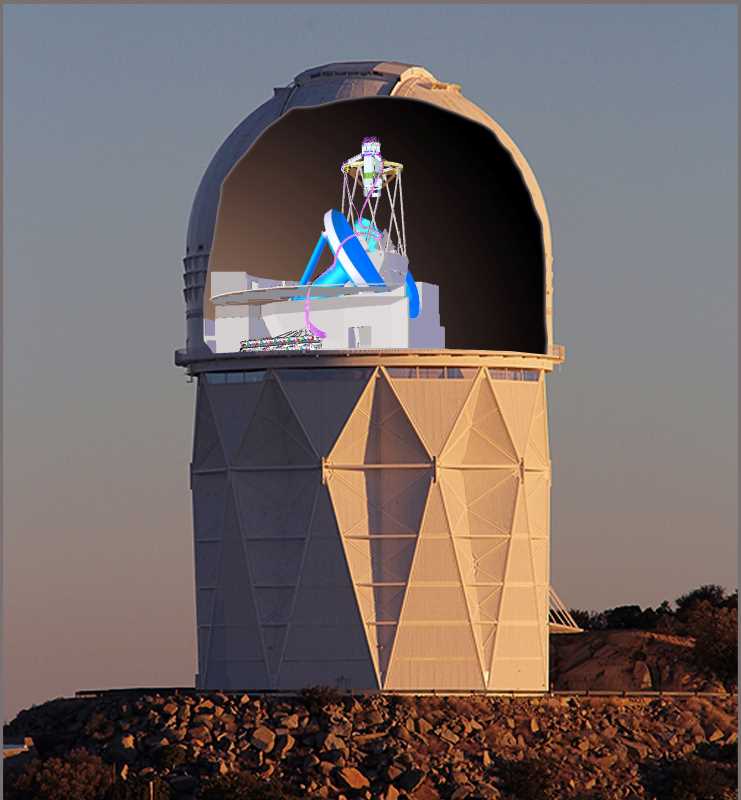Mexico's Role in the Dark Energy Spectroscopic Instrument (DESI) Project
DESI, the Dark Energy Spectroscopic Instrument, spearheaded by UNAM's Physics and Astronomy institutes, is mapping the cosmos, probing dark energy's secrets, and uniting global scientific efforts.

In the quest to understand the vast cosmos in which we reside, one project stands at the forefront of modern cosmological research: the Dark Energy Spectroscopic Instrument (DESI). A multinational endeavor, DESI seeks to shed light on one of the most perplexing phenomena in the universe: dark energy. At the heart of this groundbreaking initiative are the esteemed Physics (IF) and Astronomy (IA) institutes of the National Autonomous University of Mexico (UNAM), alongside other Mexican institutions. These include the National Institute for Nuclear Research (ININ), the National Polytechnic Institutes Center for Research and Advanced Studies (Cinvestav), and the University of Guanajuato.
DESI represents a significant step forward in our understanding of the universe's large-scale structure and promises to provide answers to some of the most profound questions about our existence. The project centers around a revolutionary instrument mounted on the Mayall Telescope in Tucson, Arizona (USA), comprising an array of five thousand robotic eyes, each equipped with optical fibers. This array has the astonishing capacity to observe a staggering one hundred billion galaxies in the Northern Hemisphere of our planet.
In a landmark press conference held at the Alejandra Jaidar auditorium at the IF, UNAM's Scientific Research Coordinator, William Lee Alardín, announced the public release of the first set of observational data from DESI. This dataset, comprising nearly two million objects, including galaxies, quasars, and stars, marks a momentous milestone in the project's progress.
The released data originates from 2,480 observations conducted over a six-month period during DESI's validation phase in 2020 and 2021. However, this is just the tip of the iceberg, as DESI aims to record tens of millions of galaxies and quasars in the years to come, culminating in the most accurate and comprehensive map of the universe ever created.
DESI's Significance
The significance of DESI extends far beyond satisfying humanity's inherent curiosity about the universe. The project exemplifies how investments in basic science and cutting-edge instrumentation can lead to groundbreaking technological innovations with far-reaching economic implications. As Lee Alardín emphasized during the press conference, this collaboration expands our understanding of the cosmos and serves as an investment in cultivating highly qualified individuals who will contribute to solving society's future challenges.
DESI's ultimate mission is to tackle one of the most pressing cosmic mysteries: dark energy. This elusive force, constituting approximately 68 to 70 percent of the universe's matter, is believed to be responsible for the accelerated expansion of the cosmos. Yet, despite its pervasive influence, the nature of dark energy remains an enigma.
Through precise measurements, DESI aims to determine the properties of dark energy, its evolution over time, and its role in the expansion of the universe. Additionally, the project seeks to provide valuable insights into the Hubble constant, dark matter, neutrino masses, and the early evolution of the inflationary universe.

DESI exemplifies the power of international collaboration in pushing the boundaries of human knowledge. With 69 institutions worldwide participating in the project, it is a testament to the global scientific community's dedication and cooperation. The project's data repository, stored on an 80 terabyte hard disk, represents an accumulation of knowledge from researchers around the world working in unison towards a common goal.
Charting the Cosmic Web
As DESI progresses, it will undertake the monumental task of mapping the structure of the universe with unprecedented accuracy. The instrument is expected to observe a staggering 40 million objects and reach distances of up to 15 billion light-years. This vast census of the cosmos will enable scientists to explore the intricate cosmic web, uncovering the hidden mysteries of “hollow filaments and knots” that weave through the universe.
DESI's quest to comprehend dark energy and unravel the secrets of the universe represents a momentous endeavor that transcends borders and unites the global scientific community. The participation of Mexican institutions, spearheaded by UNAM's Physics and Astronomy institutes, showcases Mexico's growing influence in cutting-edge scientific research.
As DESI continues to reveal the universe's most profound mysteries, it serves as a testament to the insatiable curiosity and determination of humanity to explore the cosmos. This groundbreaking project paves the way for future generations of scientists and researchers to continue unraveling the enigmas of the universe and, perhaps, uncover the very fabric of existence itself.




